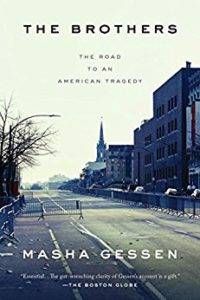
Reading Pathways: Masha Gessen
Masha Gessen is, in some ways, a voice from the future. At least, a voice from an increasingly likely version of the United States’ future. As someone who has written about, lived in, and fled Putin’s authoritarian regime, she’s sounding alarms about the actions of our current President. Recent pieces, like her New York Times op-ed with Martina Navratilova, have contributed to a renewed interest in her work. Gessen is a prolific writer and it can be difficult to know where to start. While all of her books look fascinating (and I haven’t read them all, but I hope to!), everyone has to start somewhere. Here’s the order I suggest for this particular time in our lives:
 The Man Without a Face: The Unlikely Rise of Vladimir Putin (2012)
The Man Without a Face: The Unlikely Rise of Vladimir Putin (2012)
It’s difficult to understand Masha Gessen without understanding Putin’s Russia and in order to understand Putin’s Russia, one must understand Putin. Fortunately, Gessen has a book to do just that. The Man Without a Face chronicles how a former KGB agent was essentially hand selected by Boris Yeltsin’s team to become Prime Minister, despite no one involved having any understanding of the man they’d chosen. The man they had chosen, according to Gessen, is a childhood bully turned KGB agent who capitalized on many Russians’ desire to feel a national, pre-Soviet collapse strength once again. Fascinating, chilling, and fundamental to understanding both her work and much of what’s happening in the world, The Man Without a Face is a must-read.
 Words Will Break Cement: The Passion of Pussy Riot (2014)
Words Will Break Cement: The Passion of Pussy Riot (2014)
Gessen’s book about the unequivocally badass band Pussy Riot is a testament to the power of art as protest, the emotional labor required of those brave artists, and the dangers of speaking out in an authoritarian regime. In 2012, five women walked into a cathedral in Moscow, wearing brightly-colored balaclavas. Once inside, “they performed a punk prayer” beseeching the ‘Mother of God’ to ‘get rid of Putin.’ Unsurprisingly, Putin was upset by this act. More surprisingly, at least for much of the international community, was Putin’s response. Not only was the band arrested and tried for their protest (all of which happened in under five minutes) but two of the women were sent to a remote labor camp. Gessen had virtually unfettered access to these women and outlines both how they came be involved in protest through art as well as their fates beyond the incident. Words Will Break Cement is both inspiring and chilling.
 The Brothers: The Road to an American Tragedy (2015)
The Brothers: The Road to an American Tragedy (2015)
A reading pathway for non-fiction doesn’t have to be in chronological order, but in Gessen’s case it helps (though I should note she wrote a number of books prior to the earliest one on this list). Gessen began work on The Brothers almost immediately after the Tsarnaevs carried out the Boston Marathon Bombing in 2013. This book is less about terrorism than it is about family. Gessen recounts the Tsarnaevs’ experience as children in Chechnya, their lives as immigrants in a post 9/11 U.S., and how ordinary they seemed before things went very wrong. Though Boston Marathon Bombing isn’t really discussed until the end of the book, it’s presence is felt throughout and this tension makes the book difficult to put down. Gessen resists the urge to make definitive conclusions and tie every thread, instead leaving the reader to feel the full, lingering weight of the Boston Marathon tragedy.
The Brothers is further noteworthy in light of current events–the 45th President’s Muslim Ban. I mean, if we’re talking about terrorism and preventing people from coming to the country based on their country of origin…(to be clear, I don’t believe we should be banning people from entering the country because of their country or religion) well, it might be useful to remember that one of the Tsarnaev brothers was a U.S. citizen and the other was Chechnyan citizen, with U.S. permanent residence status.

